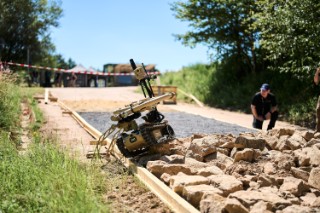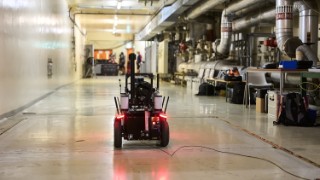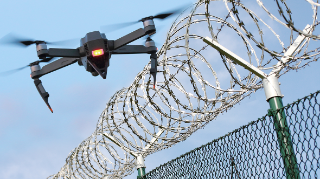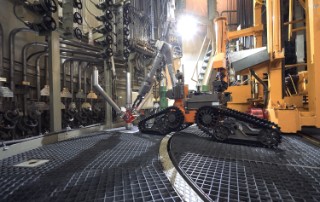How can cancer registries make the best possible use of the flood of cancer data they receive every day for research and therapy? This was the task of the “TeMeK” project, which was funded by the German Federal Ministry of Health and has now been successfully completed. The result: a tool that uses text mining and data science to support documentation and promote its use. Not only does it save documentarians time, it also contributes to standardization and brings to light aspects that were previously lost in the flood of data. The collaboration will therefore continue.
more infoPress
-
-
UAS - UGV / 2026
Quickly and Precisely Localizing Radioactive Material

Radioactive, chemical or biological substances are usually invisible in threatening situations and cannot be detected from a distance. Researchers at the Fraunhofer FKIE use specially equipped drones and robots to quickly and precisely localize radioactive sources.
more info -
Central German Institute for Security Industry (MISI) and Fraunhofer FKIE sign cooperation agreement

New cooperation in the areas of dual use and security infrastructure: The Central German Institute for Security Industry (MISI) and the Fraunhofer Institute for Communication, Information Processing and Ergonomics FKIE are now working closely together in the field of defence and security research. The cooperation agreement was signed by retired Major General Markus Kurczyk, Chairman of MISI, and Prof. Dr. Christoph Igel, Deputy Director of Fraunhofer FKIE.
more info -

The contract for the delivery of LUCHS 2 reconnaissance vehicles has just been signed. This means that in 2029, the first German Armed Forces vehicle will roll off the production line that is based entirely on STANAG 4754 NATO Generic Vehicle Architecture from the scratch. This multinational standard, co-developed by Fraunhofer FKIE, ensures that the subsystems of vehicles from several NATO nations can communicate with each other. It thus makes a significant contribution to the necessary digitalization of the armed forces. Fraunhofer FKIE and IABG have now been tasked by the Federal Office of Bundeswehr Equipment, Information Technology and In-Service Support (BAAINBw) to test the vehicle for interoperability and compatibility.
more info -

When international robotics experts gathered at the Hammelburg military training area 2006 for the first European Land Robot Trial (ELROB), no one could have predicted that it would become such a success story. Two decades later, this demanding performance comparison of military robotics is now a fixture in the calendars of researchers, clients and users alike. In the anniversary year 2026, the Swiss Federal Office for Armament armasuisse will host ELROB, which will take place from 15 to 19 June at the Thun military training area.
more info -

These were probably the most difficult scenarios since the European Robotics Hackathon (EnRicH) premiered in 2017: At the beginning of July, more than 120 robotics experts from all over Europe and Canada gathered at the never-operational Zwentendorf nuclear power plant near Vienna to test their ground robots and drones under realistic conditions at the 5th EnRicH. In the three main categories “Search & Rescue,” “Mapping,” and “Manipulation,” the organizing team from the Fraunhofer Institute for Communication, Information Processing and Ergonomics FKIE had placed an emphasis on combined scenarios for driving and flying systems, which posed problems for many teams. Many – but not all.
more info -

How can police security forces successfully detect and defend against drones? The research project "IDAS-PRO" provides an answer to this question: During the major final demonstration in Mosbach, Baden-Württemberg, the drone defense system developed over two and a half years was successfully showcased in realistic test scenarios. The attending users particularly noted the flexible deployment options of the overall system. "IDAS-PRO" can assist in many threat scenarios, including the protection of critical infrastructures (KRITIS), industrial facilities, or in a military context.
more info -

The fifth edition of the European Robotics Hackathon (EnRicH) near Vienna will start at the end of June with a new record number of participants: 15 teams from all over Europe and Canada will meet from 30 June to 4 July 2025 at the Zwentendorf nuclear power plant (NPP), which has never been in operation, to test their robotic systems under realistic conditions. It is not only the unusual venue that is unique in the world.
more info -

It is with great sadness that we bid farewell to an outstanding scientist, fantastic colleague and remarkable man: At the age of 90, Dr. Wulf-Dieter Wirth passed away on February 14, 2025, after a short but serious illness. The research community has lost a trailblazer in the field of radar technology, a creative mastermind and a man who left a long-lasting mark on generations of scientists. Many of us have also lost a cherished friend.
more info -

Since Russia's annexation of Crimea in 2014 and the start of its war of aggression against Ukraine in February 2022, the European security order and, as a result, the mission and direction of the Bundeswehr have changed significantly. Its ‘new old’ core mission is once again national and alliance defence – in close cooperation with NATO and its member and partner nations. Research within NATO creates the necessary standardisation and capabilities to make the alliance fit for its defence tasks. The major challenges include, for instance, uninterrupted communication and cooperation in joint operations. The NATO research group "Edge Computing at the Tactical Edge" (IST-193) is working on an important prerequisite for this: the federation of the various national clouds.
more info